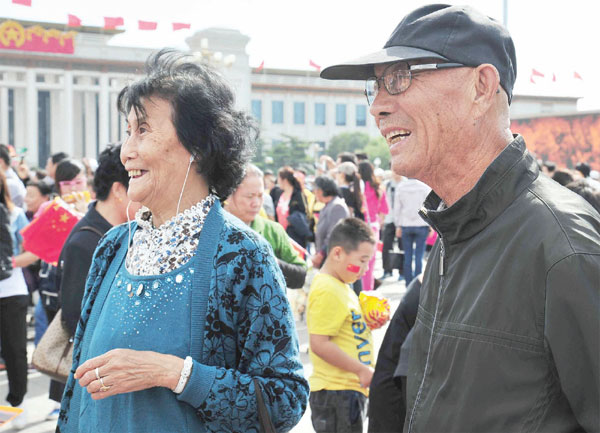'Silver' tourists may become travel goldmine
Updated: 2015-09-15 08:58
By Su Zhou(China Daily)
|
||||||||
|
A couple visits Tian'anmen Square in Beijing. As Chinese society ages rapidly, growing demand from senior tourists is likely to make them a powerful group within the nation's travel industry. Provided to China Daily |
'Silver' tourists may become travel goldmine Senior travelers get a rough deal from travel agencies, who believe the low profits they generate aren't worth the efforts required to make them. However, as China becomes an increasingly aging society, the tide may be turning for older travelers, as Su Zhou reports.
Since she retired four years ago, Chen Ying, 59, has been bitten by the travel bug.
The last trip the former physician made was at the end of April, when she visited Yunnan province in Southwest China. The 10-day jaunt included trips to Kunming, Lijiang, Dali and the Xishuangbanna Dai autonomous prefecture, but it only cost 800 yuan ($125). "I saw the advertisement at the travel agency near my home, and I thought it was a good bargain," said Chen, from Shijiazhuang, the capital of Hebei province.
Travelers age 55 and younger got an even better deal, though. They were given free trips because they were regarded as having greater spending power than seniors and were more likely to spend reasonable amounts at the various destinations.
The super-cheap package aroused the suspicions of Chen's two daughters, who warned her about the tight schedule, the strong possibility of "forced shopping" and even verbal abuse from the tour guide. Chen regarded their concerns as exaggerated because "there were a lot of seniors joining the trip", so she set out accompanied by her neighbors. They didn't actually join the group until they arrived in Kunming.
Although the trip failed to live up to the promises made in the advertisements, Chen was generally satisfied because the package was extremely cheap and she didn't feel pressured to purchase souvenirs or other unnecessary items.
"The schedule was too tight, though," she said. "For a few days it felt as though we were just driving endlessly along bumpy roads. On the 24-hour train journey back to Shijiazhuang, I didn't rest well, so I took a few days to recover from the trip later," she added. "I'm not that old, but I don't think I can endure these (cheap) tours anymore."
Aging population
Figures released by the National Bureau of Statistics in 2013 show that the number of Chinese age 60 or older was 202 million. By 2050, that number will nearly double to about 400 million.
The older generation's enthusiasm for travel is growing rapidly. According to Ctrip, a leading online travel agency, 87 percent of those age 50 and older said they definitely plan to travel, and 13 percent said they would "probably" travel. However, 29 percent of those age 25 years and younger, and 17 percent of people in the 26 to 30 age bracket, said they had no travel plans.
A survey conducted in November by the Gerontological Society of Shanghai and East China University of Science and Technology found that many customers were dissatisfied with the services and products provided by travel agencies. About 30 percent of the 2,341 seniors interviewed both online and offline complained that "they felt they had been treated without proper respect while traveling".
The survey also highlighted violations of senior tourists' rights, such as a lack of legal contracts, forced shopping, unexpected changes to itineraries and even travelers being abandoned in the middle of trips.
A retired teacher from Jiangsu province, who would only give her surname as Zhou, said she was abandoned in Beijing after she argued with the tour guides and refused to buy items in a jade shop.
"My husband and I had to book the return train tickets ourselves," said Zhou, 60.

 Man tries to sell kidney for iPhone 6s
Man tries to sell kidney for iPhone 6s
 Gems of Chinese painting at Sotheby's HK auction
Gems of Chinese painting at Sotheby's HK auction
 NYFW: Tommy Hilfiger Spring/Summer 2016 collection
NYFW: Tommy Hilfiger Spring/Summer 2016 collection
 Bus decorated with 3D painting goes into service
Bus decorated with 3D painting goes into service
 Top 10 tire companies in the world
Top 10 tire companies in the world Djokovic beats Federer to win second US Open title
Djokovic beats Federer to win second US Open title
 The world in photos: Sept 7-13
The world in photos: Sept 7-13
 Hanging in the air: Workers risk life on a suspension bridge
Hanging in the air: Workers risk life on a suspension bridge
Most Viewed
Editor's Picks

|

|

|

|

|

|
Today's Top News
Parade attendees tell Houston of honor
Boeing plan for finishing center to stir up China market
Illegal margin debts probe won't crash markets: CSRC
Prisoners on death row to get free legal aid
Kissinger anticipates promising China-US ties
Germany re-imposes border controls to slow migrant arrivals
Thousands flee California wildfire as homes go up in flames
Museum crowds wait six hours to see ancient scroll
US Weekly

|

|








